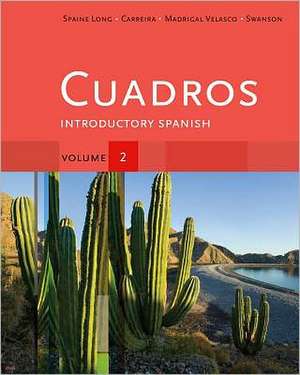Cuadros Student Text, Volume 2: Introductory Spanish: Cuadros
Autor Maria Carreira, Sheri Spaine Long, Sylvia Madrigal Velasco, Kristin Swansonen Limba Engleză Paperback – 31 dec 2011
Preț: 356.07 lei
Preț vechi: 443.09 lei
-20% Nou
Puncte Express: 534
Preț estimativ în valută:
68.13€ • 71.33$ • 56.38£
68.13€ • 71.33$ • 56.38£
Comandă specială
Livrare economică 17-31 martie
Doresc să fiu notificat când acest titlu va fi disponibil:
Se trimite...
Preluare comenzi: 021 569.72.76
Specificații
Recenzii
SEMESTER 2. Capitulo 6: 'Adonde vas? Temas. La comunidad local. Mexico. Gramatica util. 1. Indicating location: Prepositions of location. 2. Telling others what to do: Commands with usted and ustedes. 3. Affirming and negating: Affirmative and negative expressions. 4. Indicating relative position of objects: Demonstrative adjectives and pronouns. Capitulo 7: 'Que pasatiempos prefieres? Temas. Los ratos libres. Panama y Costa Rica. Gramatica util. 1. Talking about what you did: The preterite tense of regular verbs. 2. Talking about what you did: The preterite tense of some common irregular verbs. 3. Referring to something already mentioned: Direct object pronouns. 4. Telling friends what to do: Tu command forms. Capitulo 8: 'Como defines tu estilo? Temas. Estilo personal. Peru y Ecuador. Gramatica util. 1. Talking about what you did: The preterite tense of more irregular verbs. 2. Talking about what you did: The preterite tense of -ir stem-changing verbs. 3. Saying who is affected or involved: Indirect object pronouns. 4. Making comparisons: Comparatives and superlatives. Capitulo 9: 'Que te apetece? Temas. Sabores. Bolivia y Paraguay. Gramatica util. 1. Talking about what you used to do: The imperfect tense. 2. Talking about the past: Choosing between the preterite and the imperfect tenses. 3. Avoiding repetition: Double object pronouns. 4. Indicating for whom actions are done and what is done routinely: The uses of se. Capitulo 10: 'Donde vives? Temas. Ambientes. Guatemala y Nicaragua. Gramatica util. 1. Emphasizing ownership: Stressed possessives. 2. Expressing ongoing events and duration of time: Hace / Hacia with time expressions. 3. Choosing between por and para.
